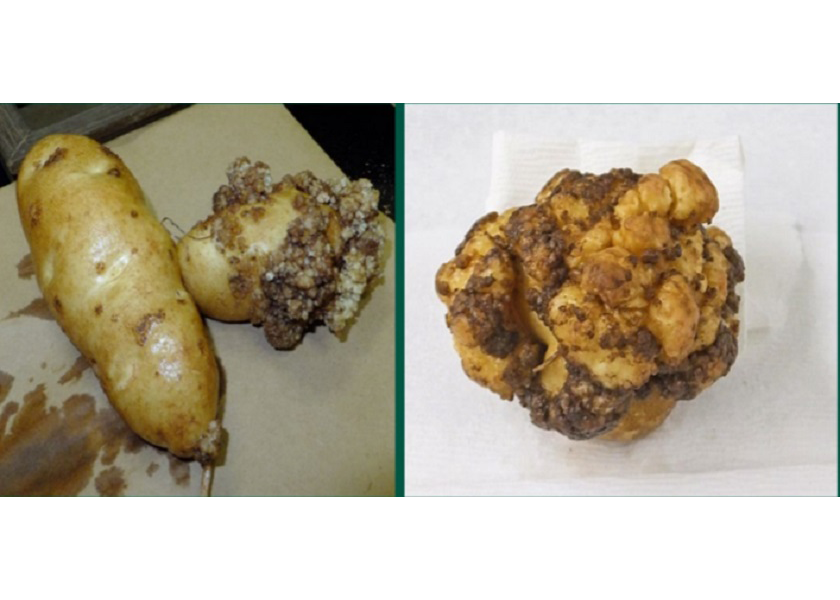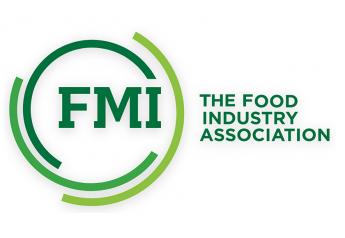UPDATED: CFIA shuts down fresh potato shipments from Prince Edward Island to the U.S.

UPDATED: In response to recent detections of the potato wart fungus in Prince Edward Island and rising concern from U.S. producers, the Canadian Food Inspection Agency on Nov. 22 said it has suspended the movement of fresh potatoes from Prince Edward to the U.S., including fresh table stock and fresh processing potatoes.
Earlier in November, Canada suspended the movement of seed potatoes from PEI to the U.S.
The CFIA said the potato wart fungus poses no threat to human health or food safety but is known to decrease yield on farms. The fungus is spread through the movement of affected potatoes, soil and farm equipment, the CFIA said.
The U.S. is a major destination for PEI potatoes. In 2020, the province reported that PEI potato exports to the U.S. totaled $476.9 million, equal to more than 90% of PEI’s total potato exports. PEI statistics did not break out export value by seed, fresh or processed components.
The CFIA said the potato wart fungus has never been detected in any other province beyond PEI, except in the Province of Newfoundland and Labrador where it has been under regulatory control for decades.
On Oct. 1 and Oct. 14 this year, the CFIA confirmed the detection of the potato wart fungus, Synchritrium endobioticum, a reportable regulated pest, in two separate fields of processing potatoes on two separate farms on PEI. That discovery followed previous detections in 33 fields across all three PEI counties since 2000, according to a news release.
The fields are related to previous potato wart detections, and have been under surveillance as per the Potato Wart Domestic Long Term Management Plan, the agency said
The CFIA said that because of the October findings, the U.S. notified Canada that the U.S. would impose a federal order banning all imports of fresh potatoes from PEI for an undetermined period of time, unless Canada takes voluntary action immediately.
U.S. potato industry groups, including the National Potato Council and 13 state associations, sent a letter to Agriculture Secretary Tom Vilsack on Nov. 16 asking the agency to “immediately suspend” all exports of potatoes to the U.S. from PEI to address the most recent area of detection.
The letter also asked that USDA restrict equipment working in PEI potato fields from crossing to the border into the U.S., and to consult with CFIA on measures to prevent transmission of the potato wart disease to the U.S.
In response to these concerns expressed by the U.S. Animal and Plant Health Inspection Service (USDA APHIS), the CFIA said it has suspended the movement of fresh potatoes from PEI to the U.S., which includes table stock potatoes and fresh processing potatoes.
The suspension does not apply to already processed potatoes, such as frozen products.
The CFIA said its order will enable the development of certification programs to support affected industries in PEI and ensure that regulated commodities are certified to mitigate concerns related to potato wart.
These measures, which may include requirements such as brushing and washing potatoes to remove any soil, are expected to mitigate the risk of spread of potato wart. At the same time, they will allow PEI seed potato farms to operate and grow seed potatoes for use within the province and to maintain the continued movement of table stock and processing potatoes to other provinces.
"This CFIA action will serve to reduce the immediate risk and provide the agency and potato growers time to assess the risk, continue the ongoing investigation into the most recent detections and determine the way forward in support of the PEI potato industry," the CFIA said in the release.
The Potato Wart Domestic Long Term Management Plan remains in place in PEI, the agency said.
Pushing back
The Charlottetown-based Prince Edward Island Potato Board said it is "shocked" by the decision by CFIA to suspend the certification of exports of all potatoes from Prince Edward Island to the U.S.
The board called for an immediate reversal of the decision, stating that there is “negligible risk” of spreading potato wart from the export of fresh potatoes, since existing trade regulations require potatoes originating from Prince Edward Island to be washed and treated with a sprout inhibitor. In addition, the PEI board said, potato wart is of no risk to human health.
The U.S. market represents a value of $120 million annually to the Prince Edward Island potato industry, according to the board.
“This is solely a politically-based trade disruption that will limit trade in a year when potatoes are already in short supply across North America and globally,” the PEI board said in the statement. “These trade restrictions will undoubtedly lead to higher grocery store prices for American consumers due to a lack of available product in regions that depend on Prince Edward Island potatoes."
The PEI board said that if the suspension of exports is not reversed, it will necessitate the destruction of hundreds of millions of pounds of high-quality fresh potatoes. “This presents not only an enormous waste of nutritious food but also a potential environmental issue related to product disposal,” the PEI board said. The volume of potatoes that PEI normally exports to the U.S. meets the fresh potato needs of approximately nine million Americans each year, according to the board.
“Without an immediate reversal of this decision, there will be far-reaching economic consequences not only for Prince Edward Island potato producers but also on the provincial economy, other Canadian potato producers, retailers, and consumers,” the PEI board said.
Unfortunate event for all
Kam Quarles, CEO of the National Potato Council, said PEI's potato wart issue is not a trade dispute.
"The U.S. doesn't benefit from this action," he said. "It actually hurts." Quarles noted that U.S processors use PEI potatoes, and fresh shipments from PEI also are valued in the Northeast.
"The reason that folks reacted so quickly is because the impact of that disease getting into the United States is just so significant," he said, adding that the U.S. was not acting against Canada, but Canadian authorities moving on the issue.
"It was the U.S. expressing concerns about PEI, but it was also the rest of Canada putting protections in place because of this disease profile," he said. At the same time PEI exports to the U.S. were suspended, Quarles said other Canadian provinces suspended the ability to export seed and put a bunch of new protections in place as well for processed potatoes and fresh potatoes from PEI.
"It really is just about kind of everyone trying to get their arms around the disease profile what's happening in PEI," he said. Quarles said investigators must determine how the disease is spreading on PEI.
"We want to have the folks in PEI backed by CFIA having a comprehensive understanding of exactly where the disease is, taking those fields out of production where you find it, and making sure that the risk is minimized," he said. "We believe that this temporary pause in exports, and obviously domestic shipments to the rest of Canada is warranted to give CFIA the time to really get in there and figure out what's going on."
After the investigation is completed and plant officials understand more about the spread of the disease, Quarles said additional protections could allow trade to resume.
"Economically, it's an ugly situation right now for both sides," he said. "But the economic cost of doing nothing is just so much greater that it's kind of forced everyone to act."







